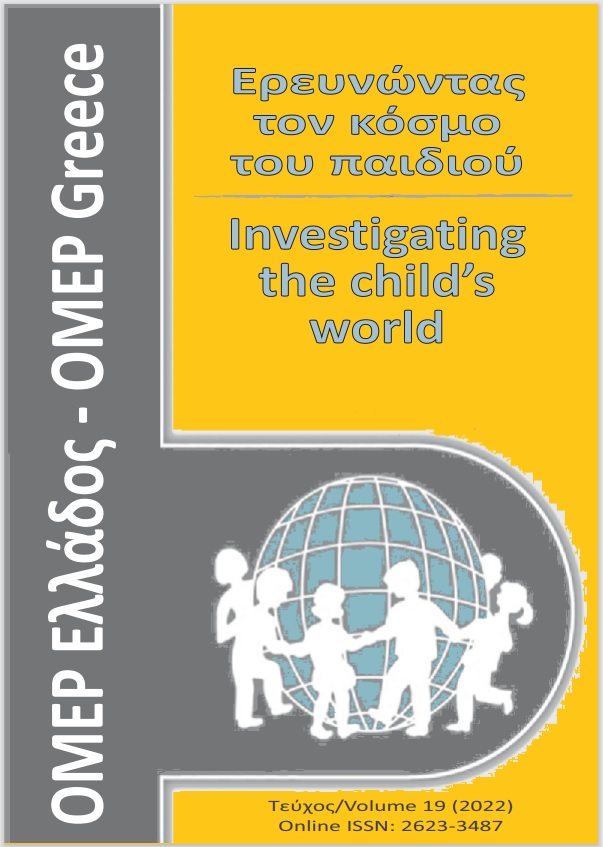Η συμβολή του παιχνιδιού στην ανάπτυξη της μαθηματικής σκέψης βρεφών ηλικίας 11 μηνών – 2 ετών. Μια μελέτη περίπτωσης.
Abstract
Η παρούσα έρευνα αποτελεί μέρος ερευνητικού προγράμματος το οποίο αποσκοπούσε στη διερεύνηση της επίδρασης της τυπικής και μη τυπικής διδασκαλίας μέσω παιχνιδιού στην ανάπτυξη της μαθηματικής σκέψης βρεφών ηλικίας 11 μηνών – 2 ετών. Επικεντρώνεται σε μία διάσταση του θέματος η οποία θεωρείται πολύ σημαντική για τη συγκεκριμένη ηλικία: τη συμβολή του δομημένου παιχνιδιού στο περιβάλλον του βρεφοκομικού σταθμού στην ανάπτυξη της μαθηματικής σκέψης των παιδιών. Τα ποιοτικά δεδομένα που αξιοποιούνται στο παρόν κείμενο συλλέχθηκαν από παρατηρήσεις των βρεφών στο χώρο του σταθμού και από δεδομένα που έχουν καταθέσει οι εκπαιδευτικοί τους στους ατομικούς φακέλους επιτευγμάτων των παιδιών. Στο πλαίσιο της έρευνας είχαν σχεδιαστεί και εφαρμοστεί οργανωμένες δραστηριότητες μαθηματικών παιχνιδιών στο χώρο ενός βρεφονηπιοκομικού σταθμού στην Κύπρο. Μέσα από την παρουσίαση δράσεων που χρησιμοποιήθηκαν συζητείται ο ρόλος του δομημένου παιχνιδιού στην ανάπτυξη της μαθηματικής σκέψης και του σχεδιασμού κατάλληλων μαθηματικών δραστηριοτήτων παιγνιώδους μορφής.
Article Details
- Come citare
-
Πέτρου Δ. Π., & Παναούρα Δ. Α. (2022). Η συμβολή του παιχνιδιού στην ανάπτυξη της μαθηματικής σκέψης βρεφών ηλικίας 11 μηνών – 2 ετών. Μια μελέτη περίπτωσης. Ερευνώντας τον κόσμο του παιδιού, 19, 5–27. Recuperato da https://ejournals.epublishing.ekt.gr/index.php/omep/article/view/29609
- Fascicolo
- V. 19 (2022)
- Sezione
- Επιστημονική αρθρογραφία & εκπαιδευτικές δράσεις

Questo lavoro è fornito con la licenza Creative Commons Attribuzione - Non commerciale 4.0 Internazionale.
Οι Συγγραφείς που δημοσιεύουν εργασίες τους σε αυτό το περιοδικό συμφωνούν στους παρακάτω όρους:
Οι Συγγραφείς διατηρούν τα Πνευματικά Δικαιώματα και χορηγούν στο περιοδικό το δικαίωμα της πρώτης δημοσίευσης ενώ ταυτόχρονα τα πνευματικά δικαιώματα της εργασίας προστατεύονται σύμφωνα με την Creative Commons Attribution License που επιτρέπει σε τρίτους - αποδέκτες της άδειας να χρησιμοποιούν την εργασία όπως θέλουν με την προϋπόθεση της διατήρησης των διατυπώσεων που προβλέπονται στην άδεια σχετικά με την αναφορά στον αρχικό δημιουργό και την αρχική δημοσίευση σε αυτό το περιοδικό.
Οι Συγγραφείς μπορούν να συνάπτουν ξεχωριστές, και πρόσθετες συμβάσεις και συμφωνίες για την μη αποκλειστική διανομή της εργασίας όπως δημοσιεύτηκε στο περιοδικό αυτό (π.χ. κατάθεση σε ένα ακαδημαϊκό καταθετήριο ή δημοσίευση σε ένα βιβλίο), με την προϋπόθεση της αναγνώρισης και την αναφοράς της πρώτης δημοσίευσης σε αυτό το περιοδικό.
Το περιοδικό επιτρέπει και ενθαρρύνει τους Συγγραφείς να καταθέτουν τις εργασίες τους μέσω διαδικτύου (π.χ. σε ένα ακαδημαϊκό καταθετήριο ή στους προσωπικές τους ιστοσελίδες) πριν και μετά από τις διαδικασίες της δημοσίευσης, καθώς αυτό μπορεί να οδηγήσει σε παραγωγική ανταλλαγή ιδεών και σκέψεων καθώς επίσης και σε γρηγορότερη και μεγαλύτερη χρήση και ευρετηρίαση της δημοσιευμένης εργασίας (See The Effect of Open Access).



